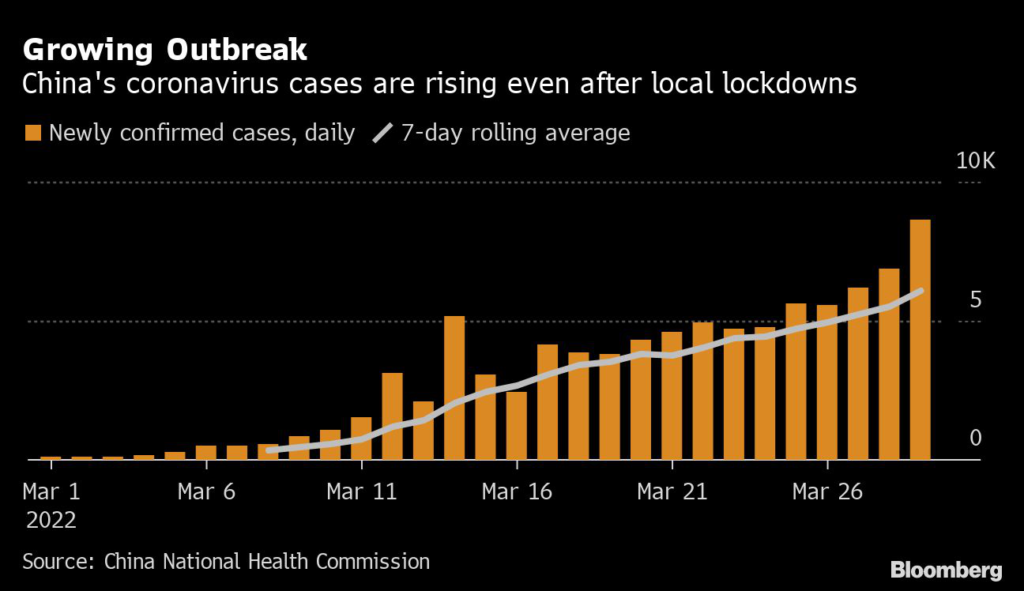(Bloomberg) — Sign up for the New Economy Daily newsletter, follow us @economics and subscribe to our podcast
China’s economy is coming under strain because of an escalating Covid outbreak, with economists warning of a deeper slowdown if lockdowns in Shanghai and elsewhere continue to expand.
Natixis SA estimates the Covid controls will cut the economic growth rate in the first quarter by 1.8 percentage points. Long-lasting restrictions across the country could push gross domestic product growth toward 4% this year, according to UBS Group AG, well below the government’s target of about 5.5%.
Economists at Nomura Holdings Inc. and NatWest Group Plc. have already downgraded their growth forecasts for the second quarter as the outbreaks worsen. Researchers at Chinese University of Hong Kong estimate a strict lockdown in Shanghai alone could reduce China’s real GDP by 4% for the duration of the curbs.
“What seems clear now is that achieving the 5.5% growth target, set by the government work report, is facing increasing headwinds, as China’s GDP will be under more pressure than earlier expected for the first quarter and more uncertainties will probably arrive in the following quarters,” Alicia Garcia Herrero, chief economist for Asia Pacific at Natixis, wrote in a note.
The latest quarterly survey from the People’s Bank of China is also flashing warning signals. Business confidence among Chinese industrial firms worsened across the board in the first quarter, with indexes measuring orders and profitability falling at the steepest rate in two years, the survey showed.
Covid infections have continued to rise in Shanghai, which is rolling out restrictions targeting half the city at a time to control the outbreak. Authorities haven’t imposed a full lockdown on the sprawling financial and trade hub of 25 million residents, but that possibility looms large. That would have far-reaching consequences for the rest of the country.
“My concern is that if even Shanghai needs to have a full-city lockdown to contain the outbreak, the prospects of a change to China’s strategy to fight the virus will not be very promising,” said Liu Peiqian, China economist at NatWest Group Plc.
The spread of the highly infectious omicron virus strain has disrupted life across the country during the worst coronavirus outbreak since Wuhan in early 2020. Cities including Langfang and Tangshan, near the capital Beijing, as well as the entire northeastern province of Jilin have been sealed off for up to two weeks. Xuzhou, in the eastern Chinese province of Jiangsu, said Wednesday it would lock down for three days.
Growth Downgrades
Zheng Michael Song, an economist at the Chinese University of Hong Kong, estimated earlier this week the Covid restrictions are likely costing China at least $46 billion a month, or 3.1% of GDP, in lost economic output. That impact could double if more cities tighten restrictions, he added.
Read more: China Lockdowns Cost at Least $46 Billion a Month, Academic Says
Liu said the outbreak in Shanghai, which contributes 3.8% to the country’s GDP, was a factor in her recent growth downgrades. She estimates the city’s staggered eight-day lockdown could help dent GDP growth by 0.4 percentage point in the first and second quarter compared to a year prior. And broad restrictions in other cities could create damage “far beyond” what she’s predicting.
“We may have to revise down our forecasts for the coming quarters in that case,” Liu added, though she said it’s tough to predict how curbs will evolve. NatWest expects GDP growth to hit 5.7% in the third quarter as fiscal policy benefits the industrial sector, with the firm maintaining its full-year growth forecast of 5%.
Shanghai authorities have rolled out some measures — including tax relief, rent extension or reductions, and loan support for small businesses, retail and catering industries hit hard by the outbreak — to mitigate the impact of the virus and restrictions.
But signs of economic pain are starting to emerge. The cost of almost every major vegetable sold in the city went up Tuesday from a day earlier, with the average cost of a Chinese cabbage jumping 17.1%, according to the Shanghai Municipal Development & Reform Commission. Pork prices also rose 8.1% during that period.
Read More: Locked-Down Shanghai Residents Struggle to Buy Fresh Food
While economists expect the hit to manufacturing to remain limited as long as Shanghai’s lockdown isn’t extended for too long, some firms are starting to feel the effects.
The trucking of goods to Shanghai’s ports and airports has slowed significantly, and delays are expected, according to logistics firms.
AP Moller-Maersk said late Monday that some facilities in the city were shut in connection with lockdowns, and that trucking services had been reduced. In a customer advisory, the shipping company said while air operations in Shanghai for existing cargo in warehouses remained normal, new cargo would be affected.
Aptiv, a supplier for Tesla and a General Motors joint venture in China, sent workers at a Shanghai production plant home on Tuesday, Reuters reported, citing sources familiar with the matter. Tesla earlier extended a production pause at its Shanghai plant until Thursday over Covid issues.
Demand for consumer electronics including smartphones, PCs and TVs has been hurt by China’s lockdowns, according to the head of Taiwan Semiconductor Manufacturing Co., the world’s biggest contract chipmaker. Chairman Mark Liu said, though, that the company is keeping its production in Shanghai going, and the firm isn’t revising down its forecasts for sales or capital spending.
Even before Shanghai’s Covid surge, economists were pessimistic about China’s growth outlook. Nomura on Saturday said the economy was facing its worst slowdown in two years, and warned economic activities for March “may notably deteriorate across the board.”
(Updates with economist’s estimate in second paragraph.)
More stories like this are available on bloomberg.com
©2022 Bloomberg L.P.











